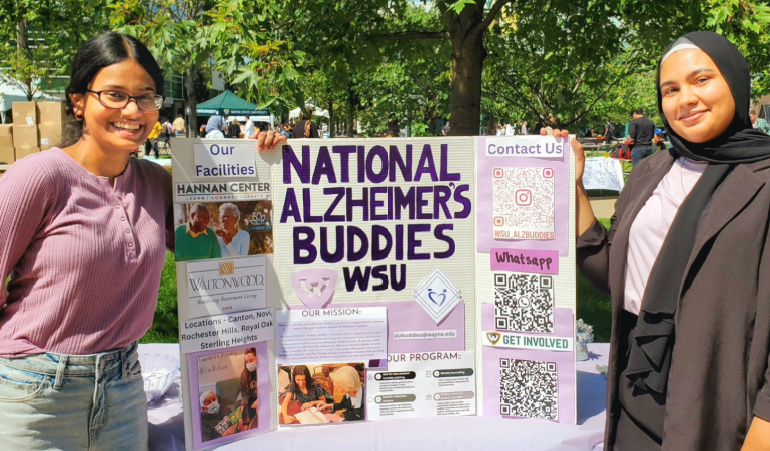Wayne State University hosts Michigan’s only Alzheimer’s Buddies chapter

Two Wayne State University undergraduates with a strong affinity for older adults have launched the campus’ first-ever chapter of National Alzheimer’s Buddies, a program to connect college students with people with dementia.
Student participants are asked to volunteer one hour each week through the semester for an in-person visit with their “buddy.” The goal is to end social isolation in dementia, and interest at WSU is high — about 20 students attended the information meeting and most have committed to joining.
An estimated 6.7 million Americans are living with Alzheimer’s disease or another form of dementia. About 20% of those people are in senior housing facilities.
“We hope this experience will make students more compassionate and informed about memory loss,” co-founder Kulsoom Ali said. Ali is a senior majoring in neuroscience with plans to apply to medical school next year. “One of my grandmothers had Alzheimer’s and passed away earlier this year. When I saw this opportunity, I thought why not just start it?”
Ali joined forces with friend and pre-med student Archana Matheswaran to organize and launch the chapter. Matheswaran, a junior, was in high school when she first volunteered at a senior residence and realized she enjoyed the company of older adults. While her friends avoided working with older adults, assuming it would be depressing, Matheswaran found it uplifting. “I walked in and saw people waiting for someone to talk to them. So we talked. We played bingo and other games. They were so engaged in what we did,” she said. “It brought my mood up every single visit. I realized it’s so important to stay connected.”
Alzheimer’s Buddies is open to WSU students in any field of study. The club worked with the Institute of Gerontology to secure locations in Detroit and surrounding suburbs, primarily independent and assisted living facilities, and senior centers, where students can be paired with buddies. Once students are matched, they receive training in how to foster the relationship and handle memory, emotional and communications challenges brought on by Alzheimer’s disease. “This is a vulnerable population, so we need to be careful to make the experience pleasant and supportive,” Ali said. She wants each buddy to look forward to every visit.
The club’s faculty advisor is Rodlescia Sneed, Ph.D., M.P.H., a social gerontologist and assistant professor jointly appointed to the Institute of Gerontology and the Department of Psychology. Her research focus is how the social environment impacts aging in diverse populations, so saying yes to Alzheimer’s Buddies was easy. Sneed has worked with other intergenerational programs over the course of her career, though the older adults did not have dementia.
“Kulsoom and Archana had a clear idea of what they wanted to do when we met,” Sneed said. “The program has real benefits for the students and the older adults. Students considering careers in medicine, nursing or another health science get valuable volunteer exposure. We also have many students here whose home is far from Detroit. They might also benefit from having a purpose beyond school and forming a home-like connection with an older adult.”
Student Buddies will meet virtually every two weeks to share experiences and get feedback. Each location also has a site coordinator to help with location-specific training and protocol. “We want all our members to feel supported,” Sneed said. “We ask each student to keep a reflection journal and complete a program evaluation so we can continue to improve the experience.”
Sneed is committed to sustaining the club from class to class as leadership graduates and new leaders rise. Ali has already secured Matheswaran to continue next year. They both feel certain this program will have value and longevity.
“WSU recently received the global designation of ‘Age Friendly University,’” Sneed said. “What could be more age-friendly than pairing a college student with a vulnerable older adult to build a relationship that will benefit both?”
To volunteer or learn more, contact alzbuddies@wayne.edu.